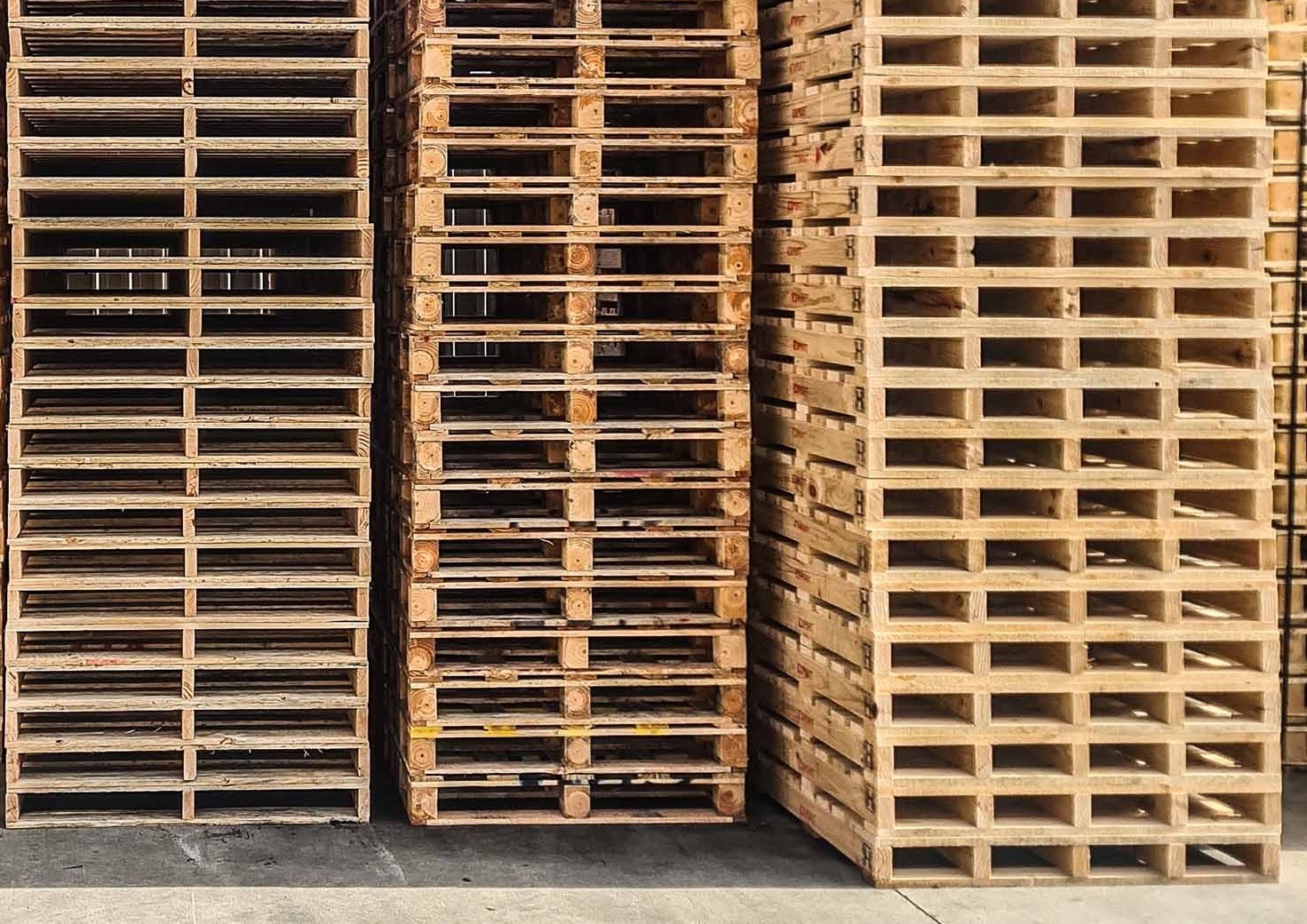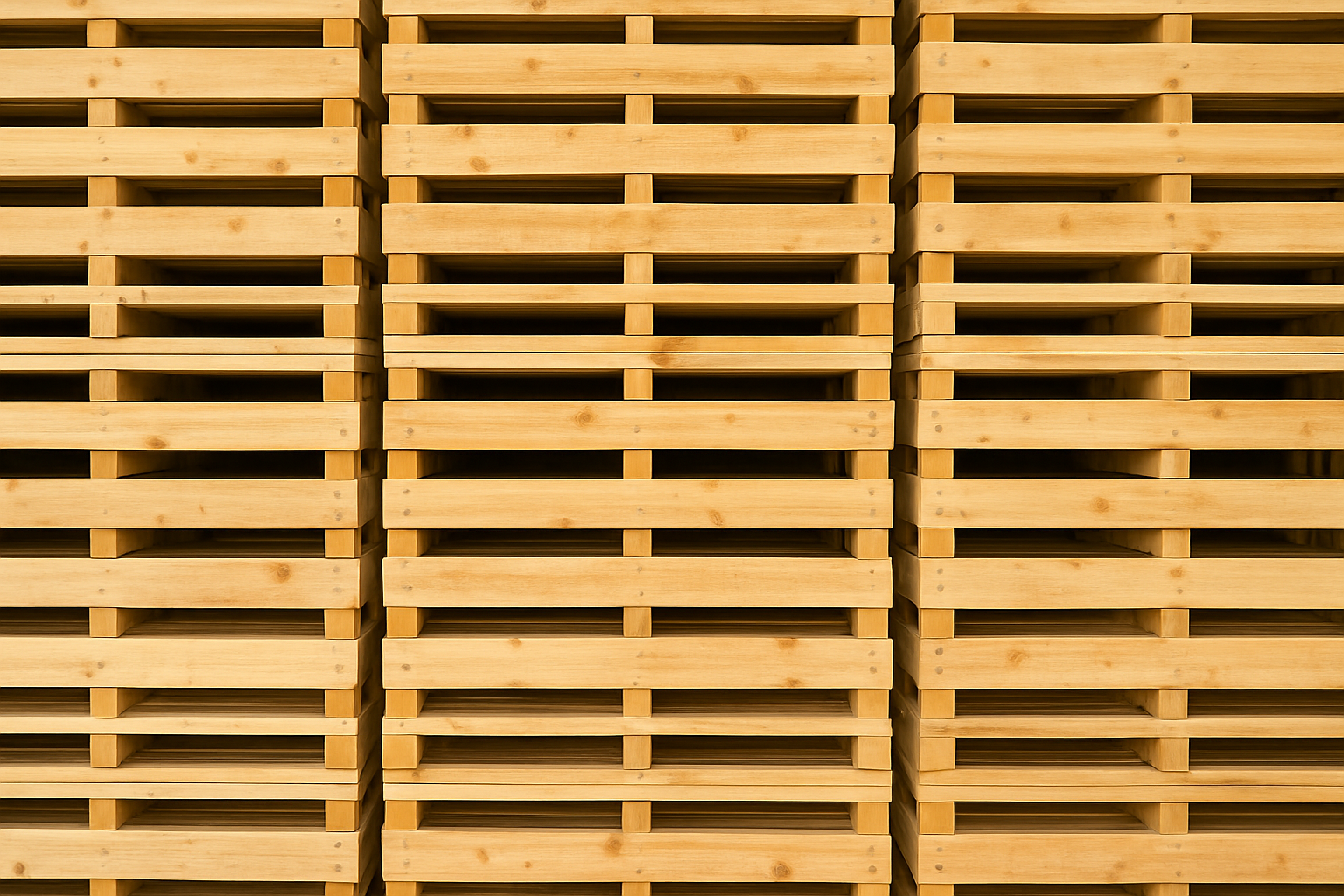At a glance
- Wooden pallets are cost-effective and eco-friendly and are widely used in retail, agriculture, and manufacturing.
- Metal pallets offer durability and strength, making them ideal for heavy-duty industries like aerospace and automotive.
- Plastic pallets are lightweight, hygienic, and resistant to mould, perfect for the food and pharmaceutical sectors.
- Choosing the right pallet depends on factors like cost, durability, sustainability, and industry-specific needs.
Pallets are one unsung hero of logistics and supply chain operations. You might think of them as no-frills, fundamental platforms instrumental in moving goods safely and efficiently. Pallet options run into the hundreds, and selecting the correct one for your business could be like finding your way through a maze. Is it the robust reliability of metal, the lightweight versatility of plastic, or the eco-friendliness of wood?
This blog will dive deep into different types of pallets, comparing metallic, plastic, and wooden pallets to facilitate better choices. Let’s see what kind of pallet fits each unique need.
Different Types of Pallets
There are three main types of pallets that are widely available and extensively used throughout the logistics industry. They include:
Wooden Pallets
Wooden Pallets, as the name suggests, are made up of wooden planks. These are the most widely used variant of pallets for logistics. Because of their sustainability factor, these are most commonly used in retails, agriculture, and manufacturing industries. These pallets can be customised according to the product attributes (size, weight), and are very much on the economical side of the pallet world.
Metal Pallets
Metal pallets are used mostly in heavy-duty industries such as automotive and aerospace. Because the products placed on these pallets are weighty, the pallets themselves are weighty, too. Metal pallets are more costly than any other, but their durable nature justifies the price. Their application is very custom, and the manufacturing process is costly. They are generally used to transfer products in rough environments, such as places/industries with extreme heat or extreme cold.
Plastic Pallets
Plastic pallets, as the term itself says, are made up of plastic materials. Plastic pallets are lighter and more sanitary, hence are mostly used in the food and pharmaceutical industries. They are resistant to rust and mould but are sensitive to heat and UV exposure. Therefore, their structural integrity can get disturbed easily.
Comparison of Different Pallet Types
All pallets have similar functionality; they support, protect, and fixate the products in their place and condition during logistics. However, there will certainly be some key differences between the types of pallets. Waterstone pallets are made of wood, and hence, we will compare wooden pallets with metal and plastic ones.
Feature | Wooden Pallets | Plastic Pallets | Metal Pallets |
Cost | Most cost-effective | Higher upfront cost | Most expensive |
Affordable, repairable, and recyclable | Not easily repairable | Pays off for heavy-duty, long-term use | |
Weight |
Moderate weight | Lightweight | Heavy |
Strong enough for most standard loads, customisable for heavier ones | Easy manual handling and great for air freight | Suited for static loads or tough industrial use | |
Durability | Good durability when used within capacity | Durable in clean settings | Extremely strong and long-lasting |
Easy to reinforce or customise | Can degrade under UV or heat | Tolerates extreme environments | |
Hygiene |
Moderate hygiene | Highly hygienic | Non-porous |
Can be treated for mould and pest resistance | Mould and pest-resistant; easy to sanitize | Can rust if not maintained | |
Sustainability |
Highly sustainable | Recyclable but synthetic | Recyclable |
Made from renewable materials and biodegradable | Energy-intensive production | Energy- and resource-intensive to manufacture | |
Applications |
Extremely versatile: retail, agriculture, FMCG, manufacturing, warehousing, distribution centres, | Specialised: food processing, pharmaceuticals, biotech, cleanroom environments | Heavy-duty only: automotive, aerospace, military, industrial storage |
e-commerce, food and beverage (with treatment), export shipping |
Wooden Pallets vs. Metal Pallets
Cost Effectiveness: From a cost perspective, wooden pallets are more affordable, have lower initial costs, and are easy to repair. Metallic pallets, however, tend to become expensive due to the specialty required to manufacture and repair, also the cost of materials.However, their maintenance or replacement is not needed frequently, saving you on repair costs.
Weight: Wooden pallets are very lightweight in comparison to the metal pallets. Wooden pallets are mostly used in non-heavy product shipment such as fruits, and other agro products, and in the retail industry. Metal pallets are way heavier than wooden pallets, as they ship products used in heavy duty industries such as aerospace and automotive.
Sustainability: Wooden pallets’ raw materials come directly from trees. Hence, they are biodegradable, which promotes sustainable usage and supports the world’s “Go Green” mission. Metal pallets, on the other hand, are recyclable and reusable, but they consume quite a lot of energy and use limited resources during their production and maintenance.
Strength: Additionally, wooden pallets are strong enough to carry various products, but in terms of extreme strength, metal pallets take the crown. Metal pallets are more durable and able to withstand adverse weather conditions and provide more days of usage, adding value to the transport process. Wooden pallets, however, can break easily if the product weight doesn’t match the specifications, and there is a hazard of infestation due to easy moisture absorption if they’re not treated.
Hygiene and Safety: Wooden pallets absorb moisture and are prone to mould. Metal pallets, despite being free from mould, can rust over time due to improper usage. However, proper and timely maintenance can avoid both of the pallets’ safety hazards.
Applications: Wooden pallets are widely used in entities working with comparatively lighter objects, such as the agriculture sector and products, logistics, retail industry, and manufacturing mechanisms. Metal pallets are specifically used in heavy-duty industries, such as aerospace and automotive.
These key differences suggest that wooden pallets are more feasible for general use unless specific usage is concerned, such as moving heavy products.
Wooden Pallets vs. Plastic Pallets
Cost Effectiveness: Wooden pallets are very economical, as they cost less than the other and are easier to repair. Plastic pallets, on the other hand, are slightly costlier than wooden pallets, as their development mechanism is more sophisticated than that of the wooden ones.
Weight: Wooden pallets are generally lightweight. However, plastic pallets are even lighter in comparison. Plastic pallets are less heavy than wooden pallets due to the use of lightweight raw materials in their production.
Strength: Wooden pallets are strong and durable. On the other hand, Plastic pallets are more prone to losing structural integrity when exposed to extreme conditions, such as UV and heat, which could damage the contained products as well. These challenges are less likely to occur with wooden pallets, as they are, up to a certain standard level, resistant to UV and heat.
Sustainability: Wooden pallets are directly sourced from nature i.e. trees, and are biodegradable. Plastics pallets, on the other hand, are created in laboratory and developed in factory. The production process is energy extensive and the product is recyclable, but not biodegradable.
Hygiene and Safety: In terms of hygiene, Wooden pallets are slightly below plastic pallets. The plastic ones are comparatively easier to clean and sanitise than the wooden ones. Wooden pallets are prone to developing mould, which is a serious health hazard that doesn’t occur when using plastic pallets, as they don’t have a porous water-absorbing surface like wooden pallets.
Areas of Application: Wooden pallets are widely used in the agriculture sector, product logistics, retail industry, and manufacturing mechanisms. Plastic pallets are generally used in the food and pharmaceutical industries, where goods have to be transported without the faintest possibility of cross-contamination.
That sums up the key differences between the wooden, metal and plastic pallets.
If you’re searching for a reliable wooden pallet supplier in Melbourne or nearby areas, you’re in the right place. Waterstone Pallets, as one of the leading wooden pallet suppliers in Melbourne, offers heavy-duty, sustainable, custom pallet solutions to fit the needs of every industry.
Contact us today to discuss your pallet needs.



